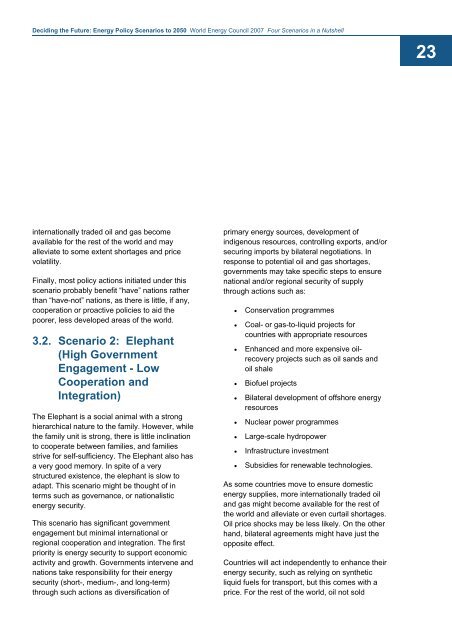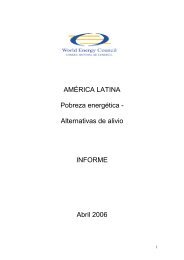Deciding the Future: Energy Policy Scenarios to 2050
Deciding the Future: Energy Policy Scenarios to 2050
Deciding the Future: Energy Policy Scenarios to 2050
You also want an ePaper? Increase the reach of your titles
YUMPU automatically turns print PDFs into web optimized ePapers that Google loves.
<strong>Deciding</strong> <strong>the</strong> <strong>Future</strong>: <strong>Energy</strong> <strong>Policy</strong> <strong>Scenarios</strong> <strong>to</strong> <strong>2050</strong> World <strong>Energy</strong> Council 2007 Four <strong>Scenarios</strong> in a Nutshell<br />
23<br />
internationally traded oil and gas become<br />
available for <strong>the</strong> rest of <strong>the</strong> world and may<br />
alleviate <strong>to</strong> some extent shortages and price<br />
volatility.<br />
Finally, most policy actions initiated under this<br />
scenario probably benefit “have” nations ra<strong>the</strong>r<br />
than “have-not” nations, as <strong>the</strong>re is little, if any,<br />
cooperation or proactive policies <strong>to</strong> aid <strong>the</strong><br />
poorer, less developed areas of <strong>the</strong> world.<br />
3.2. Scenario 2: Elephant<br />
(High Government<br />
Engagement - Low<br />
Cooperation and<br />
Integration)<br />
The Elephant is a social animal with a strong<br />
hierarchical nature <strong>to</strong> <strong>the</strong> family. However, while<br />
<strong>the</strong> family unit is strong, <strong>the</strong>re is little inclination<br />
<strong>to</strong> cooperate between families, and families<br />
strive for self-sufficiency. The Elephant also has<br />
a very good memory. In spite of a very<br />
structured existence, <strong>the</strong> elephant is slow <strong>to</strong><br />
adapt. This scenario might be thought of in<br />
terms such as governance, or nationalistic<br />
energy security.<br />
This scenario has significant government<br />
engagement but minimal international or<br />
regional cooperation and integration. The first<br />
priority is energy security <strong>to</strong> support economic<br />
activity and growth. Governments intervene and<br />
nations take responsibility for <strong>the</strong>ir energy<br />
security (short-, medium-, and long-term)<br />
through such actions as diversification of<br />
primary energy sources, development of<br />
indigenous resources, controlling exports, and/or<br />
securing imports by bilateral negotiations. In<br />
response <strong>to</strong> potential oil and gas shortages,<br />
governments may take specific steps <strong>to</strong> ensure<br />
national and/or regional security of supply<br />
through actions such as:<br />
• Conservation programmes<br />
• Coal- or gas-<strong>to</strong>-liquid projects for<br />
countries with appropriate resources<br />
• Enhanced and more expensive oilrecovery<br />
projects such as oil sands and<br />
oil shale<br />
• Biofuel projects<br />
• Bilateral development of offshore energy<br />
resources<br />
• Nuclear power programmes<br />
• Large-scale hydropower<br />
• Infrastructure investment<br />
• Subsidies for renewable technologies.<br />
As some countries move <strong>to</strong> ensure domestic<br />
energy supplies, more internationally traded oil<br />
and gas might become available for <strong>the</strong> rest of<br />
<strong>the</strong> world and alleviate or even curtail shortages.<br />
Oil price shocks may be less likely. On <strong>the</strong> o<strong>the</strong>r<br />
hand, bilateral agreements might have just <strong>the</strong><br />
opposite effect.<br />
Countries will act independently <strong>to</strong> enhance <strong>the</strong>ir<br />
energy security, such as relying on syn<strong>the</strong>tic<br />
liquid fuels for transport, but this comes with a<br />
price. For <strong>the</strong> rest of <strong>the</strong> world, oil not sold

















